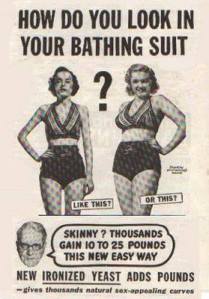“Real women, real beauty.”
“Beauty at any size!”
You’ll likely recognise the above phrases, which, rather than necessitating quotation, were plucked from my arse. I mean mind. (Bum/mind/waist-to-hip ratio; telling the difference is as hard as it is futile.)
Such clichés are the mantras of the body-positive ‘movement’: a barrage of messages women have been receiving via advertising campaigns and glossy magazines in recent years; a compassionate and diligent deflection against beauty standards imposed by advertising campaigns and glossy magazines, in the preceding and, indeed, same years.
On the Huffington Post this week, ‘Health Coach and Emotional Eating expert’ Isabel Foxen Duke posted an astute article titled ‘Why ‘Love Your Body’ Campaigns Aren’t Working’. Highlighting the above paradox of the media and beauty industries, she notes that growing up:
“I would see images of “real women” and think to myself, I don’t want to be one. I wanted to get ahead, stand out, be special”.
I have previously written about the cause-and-effect of the wondrous ironies of body-positive rhetoric, but recently the debate around Dove’s Real Beauty Sketches campaign, and Duke’s article, have illustrated not only the need to pay close attention to the reinforcement of damaging standards and ideals in the very conversations that purport to combat them, but also the need to discuss this double-standard when you see it, continually, until it takes hold.
I know the experience Duke describes to be that of many of the brilliant and big-hearted women who get behind the body-positive movement, and they do so with much strength and determination. It feels like a transformative shift in understanding for those of us who are highly body-critical, and is potentially the first step towards making one; logically, we ‘believe’ it, as a rule for ‘all women’, especially those we love around us; but most desperately we attempt to finally stamp ‘PWNED!’ on dusty, neglected certificates of self-worth.
Yet via these campaigns, fully grasping self-worth is essentially impossible. We still want to compete to get ahead, stand-out, be special; as though we have to fight each other for these scarce statuses. Our society’s structural misogyny is underpinned by the individualism promoted under capitalism, which works to prevent us from collectively understanding and willfully departing from forces which restrict us. True acceptance and transcendence from the pain and damage of the beauty myth is engulfed by a two-fold fallacy.
Firstly, the mainstream idea of body acceptance is borne at least in part from a market drive for it. Magazines and corporations that make money from selling you ‘beauty’ need you to continue wanting that in order to survive. Dove knows that there’s a huge demographic out here who are rejecting, in some form, the beauty standards that they have thus far peddled. They also know that this is a highly emotional and contentious issue that will get them a lot of attention if they appear to be on the ‘good’ side, and will earn your trust and appreciation; then they can sell you more products! Win/win! Unless we’ve all entirely missed their development team’s ironic sense of humour, Dove’s oxymoronic Pro-Age and anti-aging ranges of products highlights their rejection of the ‘acceptance’ they are selling.
Secondly, assuming (less cynically) that this is a step in the right direction, the ideas still play by the rules of the value structure it claims to reject. Every message that informs us not to worry, we are beautiful despite our size, despite our ‘flaws’, despite our inability to lose weight, continues to frame the conversation under the heading Beauty is Important, Necessary, Fulfilling, Enriching. It continues to promote its own importance, encouraging ignorance of self-improvement in any other way; of other people; of political dynamics; of spirituality; of critical thinking; of the inane, false standards these messages hold us to.
Duke stated that “women want to experience, they want to feel, they want to be… far more than they want to look. Unfortunately, we’ve been taught that looking a certain way is a prerequisite for “achieving” throughout the rest of our lives.” Her article is commendable, in that it acknowledges that most women worry about body and beauty, and this is a real issue that creates pain (I would add: created for us, and by us, under patriarchy.)
“If we don’t actively dismantle the myths that have been embedded into women’s psyche around weight historically, those myths will linger, regardless of how many plus-sized models they see on billboards (again, important first step, but not necessarily the “answer” for women suffering from body hatred now).” Indeed. The only way to find an answer to this falsehood is to reframe the questions; so that at some point, we instead ask others.
We all can, and have achieved many things. We can and will continue to. Physical appearance doesn’t truly factor into happiness or success: an employer may well hire you based on your appearance. Do you see yourself being happy working for that employer? And who says getting the job you wanted will make you happy or successful? Yet another accepted standard of happiness that you are allowed to redefine as you see fit.
Thankfully, you may also define beauty; personally I’ve found it in plenty of places. Not only are they not all visual, only a minority was attached to human flesh.

